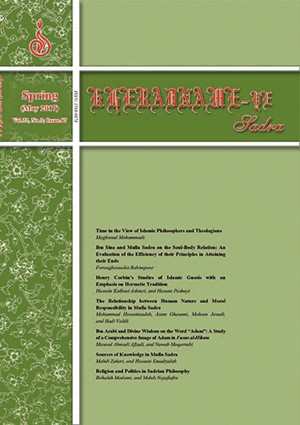Ibn Arabi and Divine Wisdom on the Word “Adam”: A Study of a Comprehensive Image of Adam in Fusus al-Hikam
Subject Areas :Masood Ahmadi Afzadi 1 * , Nawab Moqarrabi 2
1 -
2 -
Keywords: Ibn Arabi Adam and Eve Creation names and attributes Iblis (Satan) angels ,
Abstract :
The most important point in the “Adam” chapter of Ibn Arabi’s book of Fusus al-hikam pertains to the whyness of the creation of Adam and the world. Within our religious and Islamic context, the first response to this question is based on the famous holy hadith that considers the Divine Knowledge as the basis and reason of creation. However, this knowledge-based response is too vague and insufficient to explain the whole story and needs to be expanded. One can view this problem from another perspective: there are, in fact, two different views; one is based on a general image of believers in Abrahamic religions, and the other rests upon the oneness of being. In the latter image, which is the most important image for epistemologists in the field of Divine Knowledge, God is both the outermost and the innermost; He is both the beginning and the end. Adam (human being) is both creation and truth; he is the gathering point of all divine names, and the world is a mirror in which God and Adam see themselves. The angels are also the powers of the world; glory and beauty are the two hands of God. Moreover, the perfect Man is the same single soul. Finally, it is noted that God’s vicegerent on Earth possesses both the image of God and the image of the world. In this paper, the writers have tried to explore this image from various angles and, ultimately, provide a comprehensive picture of the problem under debate.
آسين پالاسيوس، ميگوئل، زندگي و مكتب ابن عربي، با مقدمه عبدالرحمن بدوي، ترجمه حميدرضا شيخي، تهران، اساطير، 1385.
ابن تركه، صائن الدين، شرح فصوص الحكم، تحقيق و تعليق محسن بيدارفر، قم، بيدار، 1378.
ابنعربي، رسائل ابن عربي، تصحيح نجيب مايل هروي، تهران،مولي، 1367.
ابنعربي، فصوص الحكم، ترجمه، توضيح و تحليل، محمدعلي موحد و صمد موحد، تهران، كارنامه، 1385.
پارسا، خواجه محمد، شرح فصوص الحكم، بكوشش دكتر جليل مسگرنژاد، مركز نشر دانشگاهي، تهران، 1366.
جندي، مؤيدالدين، شرح فصوصالحكم، با كوشش سيدجلالالدين آشتياني، دانشگاه مشهد، 1361.
حسن زاده، آملي، حسن، ممدالهمم في شرح فصوص الحكم، وزارت فرهنگ و ارشاد اسلامي، 1385.
خوارزمي، شرح فصوصالحكم، ج1، تصحيح حسن حسنزاده آملي، قم، بوستان كتاب، 1377.
سعيدي، گلبابا، فرهنگ اصطلاحات عرفاني ابنعربي، تهران، انتشارات زوار، 1392.
شيرازي، ركنالدين، نصوص الخصوص في ترجمه الفصوص، به اهتمام دكتر رجبعلي مظلومي، انتشارات دانشگاهتهران، 1359.
فخررازي، التفسير الكبير، بيروت، داراحياء التراث العربي، 2001م.
فيض كاشاني،كلمات مكنونه، قم، آيت اشراق، 1390.
قيصري، شرح فصوصالحكم، به اهتمام سيدجلالالدين آشتياني انتشارات علمي فرهنگي، تهران، 1386.
مجلسي، محمد باقر، بحارالانوار، ج84، بيروت، 1403 قمري.
مسعودي، عليبن حسين، مروج الذهب و معادن الجوهر، ج1، محقق يوسف أسعد داغر، قم، دارالهجرة، 1409ق.
ملاصدرا، شرح الأصول الكافي، ج1، تحقيق و تعليق رضا استادي، باشراف آيت الله سيدمحمد خامنهاي، تهران، بنياد حكمت اسلامي صدرا، 1384.
نيكلسون، رينولد، يادداشتهايي در باب فصوصالحكم، ترجمه آوانس آوانسيان، تهران، نشر ني، 1366.

